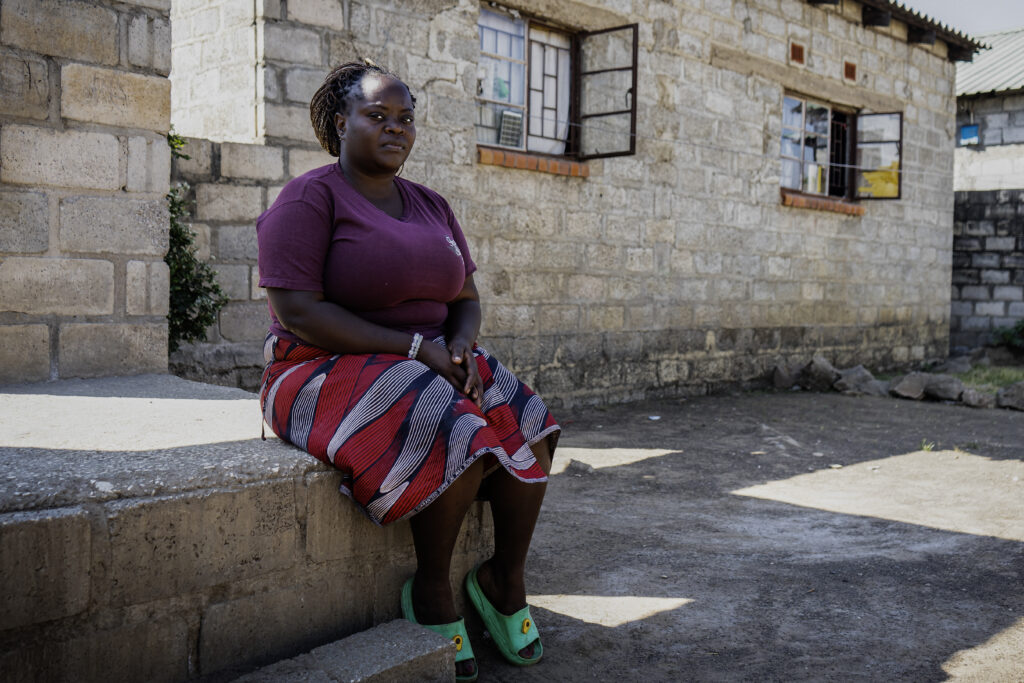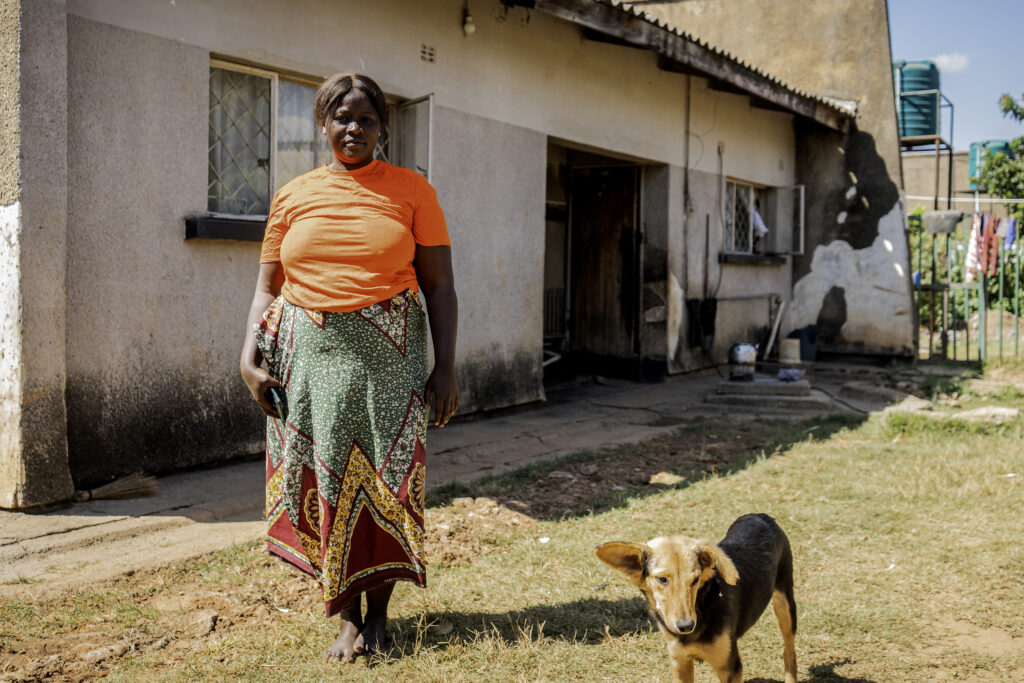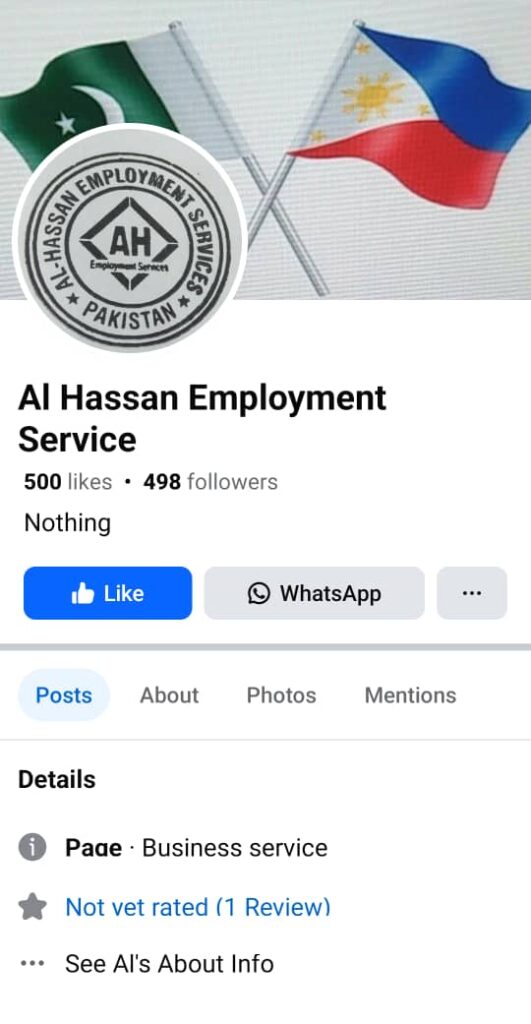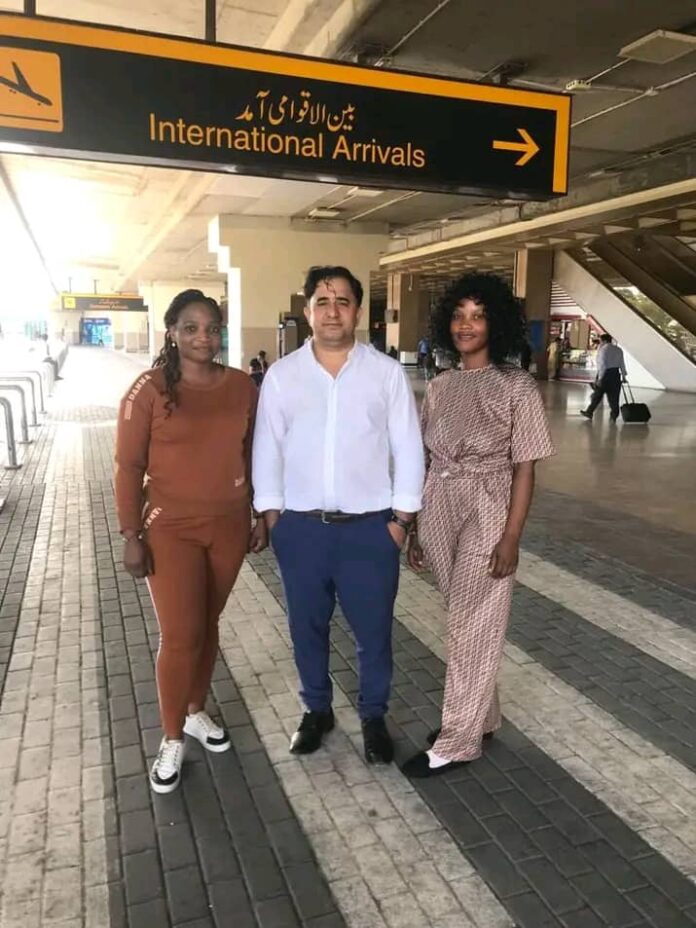Zambian women are being lured into abusive jobs abroad, stripped of their passports and abandoned — while the man behind it continues to profit, undisturbed by authorities.
By Annie Zulu
When a friend connected 22-year-old Blessings Banda* to a recruitment agent via WhatsApp, she rejoiced at the prospect of earning a decent living. Three years later, she is stuck in Pakistan with a two month-old baby, destitute and unsure of when she will return home.
Blessings is a single mother from Zambia’s Copperbelt Province. The agent, who identified himself as Jam Hussain, promised her a well-paying job as a domestic worker in Pakistan. He claimed to represent Al-Hassan Employment Agency in Karachi and assured her of $300 monthly salary, good working conditions, and a safe home.
“I thought this was my chance to change my life and give my child a better future,” Blessings said during a phone interview.
At first it all went astonishingly smoothly. Within weeks, she had successfully applied for a passport. Hussain then sent her a visa and plane ticket, she said. But, unawares, she was in fact stepping into a trap of abuse and exploitation, far from home.
Zambia has not traditionally been seen as a source of trafficked domestic workers to South Asia, including Pakistan, which has long drawn international criticism for mistreating foreign domestic workers. But this investigation, including undercover reporting, reveals a troubling and emerging trend: Zambian women are being lured to Pakistan, then forced into sometimes unpaid labour, servitude, and even prostitution. At the centre of this alleged racket is the Al-Hassan Employment Agency and its elusive frontman Jam Hussain.
Zambia’s Anti-Human Trafficking Department director Boris Mulengu confirmed, during an exclusive interview at his office in Lusaka, that his department is tracking a rise in such cases.
“We are aware of the rise in cases of human trafficking to Asian countries involving Zambian women,” he said, during an interview at the Ministry of Home Affairs and Internal Security headquarters in Lusaka in March.
Both Zambia and Pakistan are ranked Tier 2 in the 2024 U.S. Trafficking in Persons Report, which means these countries are making efforts to combat trafficking but still fall short on key protections.
That shared status leaves victims caught between two systems unable – or unwilling – to protect them when they are trafficked or are trapped into servitude. The 2024 United Nations Office on Drugs and Crime Global Report on Trafficking in Persons flags South Asia as a major destination for trafficked domestic workers and notes a rise in African victims in transnational trafficking flows.
Blessings Banda’s ordeal
Following Hussain’s instructions, Blessings travelled by bus from Zambia to Harare, in Zimbabwe, with two other women. There someone, whom they understood to be an accomplice working with Hussain, arranged their flight to Karachi.
Hussain picked her up from the airport and took her to his home and office. Here, her documents were taken by Hussain, she said. She was later taken to Lahore and placed in the home of an elderly woman with three children and grandchildren. She quickly realised the job was nothing like promised. She was offered a tiny, windowless room with a broken bed and thin blanket. She was not allowed to leave the house, she said.
“The room was dark and had no proper ventilation,” she recalls.
She worked long hours on little food, surviving on scraps, with just three hours of sleep a night.
Her employer called her a “dog” and other slurs. Her salary was halved from $300 to $150 – an amount she says she only received once.
When she complained to Hussain about this, he ignored her. Desperate for the full pay she was promised, she confronted her employer and was thrown out, forced to sleep on the street.
“I had nowhere to go. I slept outside that night, hungry and cold. I cried until morning,” she says.
Hussain later placed her with another employer, but there the conditions were even worse. She was mocked for her race. They told her “black people smell”, she said, and she was sexually harassed by the male employer.
“One time, he tried to force himself on me,” she recalled. “When I refused, he pulled out a gun and told me, ‘If you say no again, I will shoot you.’”
Fearing for her life, she escaped. But without a passport, job, or support, she had nowhere to turn.
Stranded in Lahore, Blessings linked up with a group of Zambian women, many also lured by Hussain and some of whom had been in Pakistan for years. With no shelter or income, some of these women had been forced into prostitution as a means to survive. They relied on Nigerian men, men Blessings understood to be in the drug dealing and scamming business, for accommodation. These men demanded sex in return for a place to stay and basic necessities, she said.
Blessings stayed with one such man until he left for Nigeria, leaving her homeless again.
A few months later, she began falling ill frequently. When she finally was able to get to a hospital, they told her she was pregnant and HIV-positive. She contracted the virus while in Pakistan, she believes. With no legal documents, she is now unable to access ARVs and relies on Septrin, an over-the-counter antibiotic she buys from pharmacies, knowing it is not enough to keep her and the unborn baby healthy.
To this day, she is stuck in Pakistan. She was interviewed for this piece via WhatsApp calls, during which she desperately pleaded for help.
To make matters worse for the women, Zambia currently does not have an embassy in Pakistan, making it harder for victims like Blessings to seek help or get a way back home. Desperate to return home, she contacted Hussain on several occasions through 2024 and 2025. Instead of helping, he demanded $450, a kind of ransom he called a “release fee.”
Despite paying, her passport was never returned.
“I want to go back home to my family. I don’t want to die here,” Blessings said.
Other women trapped in Pakistan, and those who have returned
She is not alone. We spoke to two other Zambian women still stranded in Pakistan, one also in Lahore and the other in Karachi. Both were recruited via WhatsApp by Hussain. Fearing retaliation, they asked not to be named.
“My boss calls me mad and blames me for things I haven’t done. I asked Hussain for my passport to go home, but he refused. I’ve lost hope,” said one woman.
“I am only surviving,” the other woman added. She works long hours, is barely fed, and sleeps on a torn mattress, in a dank, windowless room, she said.
Some do make it home, thanks to social media. Zambian social media influencers are known to take up the plight of women who are stuck in Pakistan. When the women’s videos go viral, as they sometimes do with the help of influencers, action is spurred.
A number of the women we were able to trace had posted urgent pleas for help from authorities or requesting money to get them home. It did help. In March 2024, a GoFundMe campaign raised £158 for Zambian domestic worker Isabel Kayamba’s repatriation. Her family and friends raised the rest of the money to bring her home from Pakistan, and she returned in April 2024. She sat for an interview with Zambian social media influencer Ruth Sinkala to talk about her experience.
Adolphine Lupasha, a 32-year-old single mother from Lusaka, is also finally back home, after a similar ordeal. She was promised a healthcare job in Pakistan in January 2024. But on arrival, she was sent to work as a housemaid in Faisalabad. Her promised $600 salary was slashed to $300, then withheld by Hussain.
“My Zambian friend in Pakistan connected me to Hussain on WhatsApp,” Lupasha said.

Photograph by Chona Mwemba / SA | AJP
Her employer mocked her for her race and appearance and confined her to a locked room with a surveillance camera. At one point she was locked in a tiny room for two days with no food, water or toilet, she says.
“When they locked me in that room, luck was on my side. They forgot to take my phone,” she said.
Using her phone, she secretly recorded videos and posted them on social media. These gained traction with Zambian influencers like Lily Mutamz and pages like The Diaspora Chronicles which helped amplify her cries for help. Her rescue came through the Organisation of Zambians Abroad (OZA), a civil society organisation, which helped raise funds. She returned to Zambia on April 18, 2024.
“Coming home felt like a dream. I never thought I’d see my loved ones again. I’m so grateful to be safe,” she said.
Sister Patience Shinondo of Talitha Kum Zambia, a Catholic anti-trafficking network, urged the government to tackle youth unemployment as a way to reduce vulnerability to trafficking.
“These traffickers treat young women like commodities,” she said, during an interview. “We need job opportunities at home to stop this cycle of abuse.”

Photograph by Chona Mwemba / SA | AJP
Another woman, Juliet Chali, 30, from Kitwe, who had accepted a job through Hussain’s agency. She was shuffled between three homes as a maid without pay. Her employer claimed Hussain had described Africa as a bush and said Juliet should “work like a cow.”
She eventually escaped, but was stranded without a passport.
“The only survival when you escape is prostitution – sleeping with Nigerian men. Hussain takes your passport the moment you arrive,” she said, during an interview at her home in Kitwe.
“I couldn’t cope with that life.”
Her social media plea reached Zambian authorities and the International Organisation for Migration (IOM), who coordinated her return.
Lucia Chijingu, 26, from Kitwe, fell victim to Hussain in 2022. Now safely home, she said her employer told her she had been bought and must work without rest.
“They said I was a slave and poor. Those words broke me,” she said. “I’d never advise anyone to go to Pakistan. Some women even end up dying.”
Reporter undercover
Despite such accounts, Hussain continues, unhindered, to recruit women in Zambia. To test his methods, this reporter went undercover, posing as a desperate single mother seeking work. Within minutes of making contact via WhatsApp, Hussain sent a voice note: “Who gave you my number?”
After claiming to be referred by a friend’s cousin, he replied: “Send me your passport fast.”
He was not interested in experience, background or references. He had no questions. Just a demand for a passport, which he needs to secure a visa and a plane ticket.
Trafficked woman intercepted
Just a few days later, one of the women interviewed for this story tipped the reporter off about a young woman who was booked to fly to Pakistan in early March. The woman’s mother shared documents and information related to her daughter’s plans to travel to Pakistan to work as a housekeeper. These raised various redflags – the visa and contract looked similar to other ones reviewed during this reporting – and these confirmed that Hussain had recruited the woman.
Her flight ticket had already been purchased for her, a common tactic used by Hussain to lure victims into a sense of security. A red flag on her contract was a two-year contract from the employer with a suspicious 2023 date stamp, despite it being 2025. The contract promised just $350 per month, with vague clauses.
Inside sources – two senior officials at Zambia’s Department of Immigration, who wished not to be named – confirmed she and two other women destined for were intercepted, due to the information that the woman’s mother shared with the authorities.
None of these women had received clearance from the Ministry of Labour, as required for overseas employment under Zambia’s Employment Code Act No. 3 of 2019, the sources said. Zambia’s Employment Code outlines strict requirements: labour migrants must have an attested contract, passport, national ID, valid employment permit, and the employer must post a financial security bond.
But some cases slip through.
Mulengu, the director of Zambia’s Anti-Human Trafficking Department, said that while exit processes for work abroad are clear, there are loopholes.
“The process of leaving the country is legal, and everything appears to be in order,” he said.
“People leaving are not necessarily required to show contracts. Many don’t say they’re going for work.”
Despite these limitations, he said authorities act based on intelligence and public reports. However, he did not specify any proactive steps to prevent the practice or provide detailed measures for supporting victims.
One of the women we spoke to, Lucia Chijingu, was trafficked in 2022. She and others confirmed Hussain covered all costs. Interviews with the women revealed he receives lump-sum payments from Pakistani employers, which he uses to fund travel, and then appears to keep the rest for himself. Some employers justify not paying the women because of the amount they had paid Hussain to get them to Pakistan in the first place. Some victims are later recruited to bring in more women. Hussain also works with Zambian accomplices.
The people allegedly working with Hussain are known to the women by vague names and aliases. One, “Mr. Ron” in Lusaka, arranged tickets and transport. His company, R & R Traveling Consultancy, has no record in Zambia’s business registry.
Others include a “Mr. Kasonde,” who housed women en route to Zimbabwe, and a “Madam Martha,” whom we reached by phone. She openly admitted to connecting girls to Hussain and receiving commissions.
Is Al-Hassan Employment Services even registered?

We searched for Hussain’s company, Al-Hassan Employment Services, in Pakistan’s registry and found no record. A Facebook page under that name hadn’t been updated since 2017.
A 2019 YouTube video described the agency as recruiting from Zambia, Nigeria, and the Philippines.
In the video’s description, Al-Hassan Employment Services brags about recruiting workers from Zambia, Nigeria, and the Philippines for “better opportunities.” This marketing strategy directly contradicts the harrowing realities experienced by victims like Blessings and others, who were trapped, abused, and left stranded.
Hussain’s personal Facebook page is restricted. With help from a former victim, we gained limited access, finding more than 10 photos of newly arrived Zambian women in his office and at airports.
Hussain’s right of reply
We contacted Hussain via WhatsApp to confront him with the allegations, and also sent a formal right-to-reply letter. However, he declined to respond and instead, deleted the Al-Hassan Employment Services Account from Facebook.
Achaje Magai, Deputy Director of the Anti-Human Trafficking Department in Zambia told us in mid-May that a committee has been established to look into the issue comprehensively.
This is weeks after we first alerted them to Blessing’s plight and other cases. Magai says the committee will collaborate with Interpol, the International Organization for Migration (IOM), the Zambian Embassy in China (which covers Pakistan), and the Pakistani authorities. One concrete promise was made: that Blessings will be repatriated back to Zambia soon.
Blessings gave birth to a baby boy, in early April. Because she needed urgent medical attention close to her due date, Hussain finally released her passport, else the hospital would not have attended to her.
*Real name concealed for the safety of the woman, who is still in Pakistan
*This investigation was produced by the Southern Africa Accountability Journalism Project (SA | AJP), a project of the Henry Nxumalo Foundation funded by the European Union. The article does not necessarily reflect the views of the European Union.

Discover more from MAKANDAY
Subscribe to get the latest posts sent to your email.



